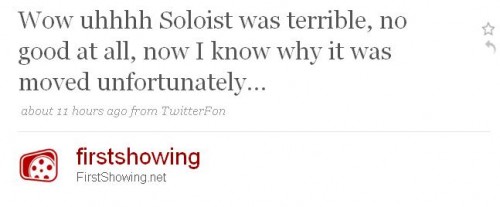
By Will Gilliam
Earlier today I was listening to the latest episode of No Agenda, by Adam Curry (yes, that Adam Curry) and John C. Dvorak, and the two started talking about Twitter. They went on to discuss the ways in which it will affect media, and to an extent, journalism. So, that got me thinking: What is film journalism? And with these new websites like Twitter, how is it going to change in the future?
If you were to walk up to a random stranger on the street and ask them what a film journalist is, what do you think they would say? The average person would likely describe them as a person who reviews films and interviews actors. Is that really what the state of film journalism is now? Interviewing the director and cast of a Will Smith movie, trying to find out what sort of crazy pranks he pulled on them throughout filming? The role of the journalist is to ask questions and uncover the truth, and while that is uncovering a truth, it’s not the truth that needs to be dug up. While not held in the highest esteem, gaming journalism has come into its own in recent years, extending beyond just reviews and previews, and actually holding developers accountable for their products. When was the last time you saw someone hold a director or actor accountable for a poor film? I could likely count the number of times I’ve seen that happen on one hand.
Granted, reviews and previews serve their place in film journalism, but there needs to be an evolution from that. Film Journalism needs more writing like Dan’s recent piece on Hollywood Eurocentrism; something that isn’t just a fluff piece, but actually examines and questions major film practices.
Now, what does the future hold for film journalism? The reason I mentioned Twitter earlier (besides being the inspiration for this post) is because I think it will have a significant impact on journalism as a whole. With the fall of print, I cannot see how Twitter will fill to gain a larger user base. One of the main reasons I joined Twitter was so I could follow the writers and personalities that I admired the most, and once people learn that they can follow their favorite journalist on Twitter, why won’t they? The only problem, though, is the 140 character limit. Because of this, everything will have to be delivered in bite size chunks, and there will be nothing truly substantial (look at the above image, a response to The Soloist screening at ShoWest). I would like to think that I am wrong, but the growing number of major film websites turning to Twitter as a means of delivering what basically amounts to free PR leads me to believe otherwise.
What do you guys think? Do you disagree with me? How do you envision the future of film journalism?

